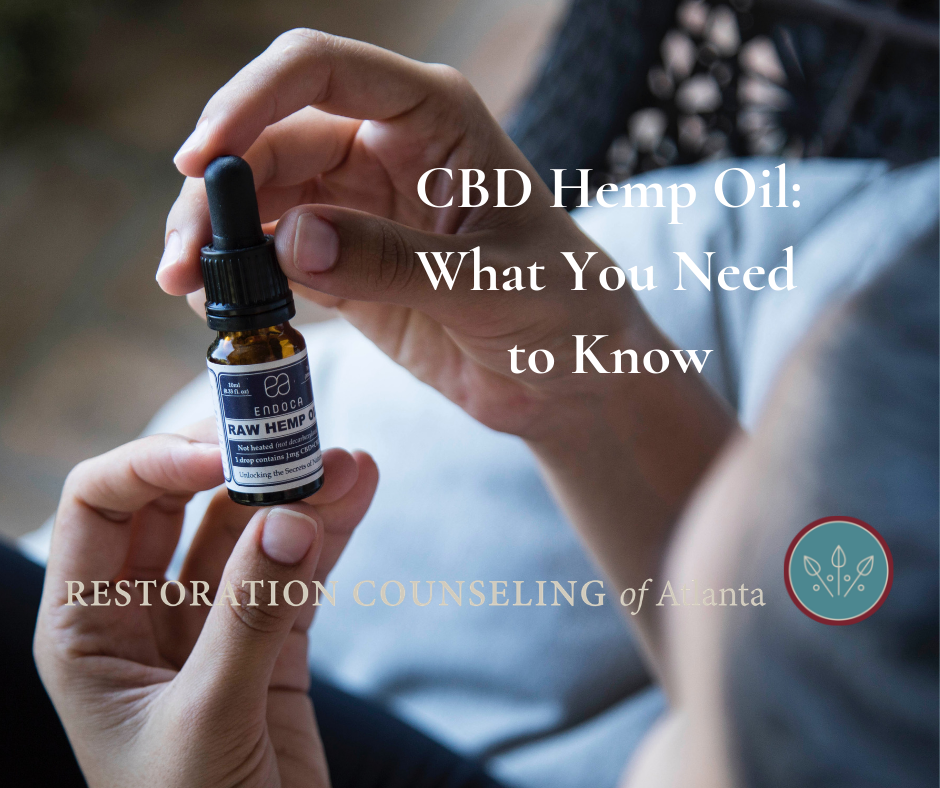CBD hemp oil is rapidly emerging as one of the most popular natural remedies on the market today. It seems to be literally everywhere. Both alternative and conventional businesses scrambling to cash in on the craze by boldly advertising its health benefits. But what is it, how does it work, and is it something I should use?
What is CBD Oil?
Cannabidiol (CBD) is a cannabinoid, a type of compound found naturally in cannabis sativa. There are over 100 types of cannabinoids in the cannabis plant, including THC, the type that gets you high. However, CBD is not psychoactive and doesn’t cause that euphoric, ‘high’ feeling because it is derived from industrial hemp, a low-THC/ high-CBD variety of cannabis sativa. It can be consumed via several methods, including tincture (usually by putting drops under the tongue), capsules or softgels, vaping, lotions, or even in foods.
How does it work?
CBD oils work on the endocannabinoid system (ECS), a vast communication network of cannabis-like chemicals – called endocannabinoids – and receptor sites found across all cells in our bodies. It acts as a homeostatic regulator, meaning that its main action is to bring balance to our bodies and minds. The ECS plays a significant role in modulating physiological functions such as mood, cognition, pain perception, and “feeding behavior.” The ECS also interacts with the immune system and moderates inflammatory processes. Think of it like a dimmer switch – it turns up activity if there isn’t enough or turns down elements if there is an excess.
What are the benefits?
The FDA has approved one hemp-based drug for the treatment of severe forms of epilepsy, and studies sponsored by the National Institutes of Health are looking into how CBD can relieve symptoms caused by muscle pain, arthritis, spinal cord injuries, and MS pain.
CBD has been purported to relieve pain, reduce inflammation, reduce anxiety, help to alleviate cancer-related symptoms, treat certain neurological disorders and seizures, relieve nausea, reduce acne, promote good sleep, help with insomnia, and promote cardiovascular health. Supporters also assert it can help with SAD (seasonal affective disorder), a type of depression related to the change in seasons, PMS, IBD, and arthritis, among other claims.
What are the side effects?
As with anything being consumed, it is important to remember that CBD can affect everyone differently and what might happen for one person might not be the same for you. The known side effects include dry mouth, a drop in blood pressure, nausea or vomiting, lightheadedness, drowsiness, increased tremor in Parkinson’s disease patients, diarrhea, anxiety or depression, changes in weight or appetite, fatigue, and even psychosis. There are also potential negative drug interactions that should be discussed with your doctor.
*** It is highly recommended that consumers consult their doctor before taking CBD, especially if taking medication of any kind.
Is it legal?
In 2019, CBD oil is legal in most countries around the world as long as it contains low levels of THC (the natural compound found in cannabis plants that makes you ‘high’). However, answering the question as to whether CBD hemp oil is legal is not that straightforward because it depends on whether the CBD is from one of two sources: hemp with low levels of THC (under 0.3%) or other forms of cannabis with high levels of THC. It all depends on how much THC is found within the CBD product.
In the U.S., CBD was legalized in all 50 states by the 2014 Farm Bill, which served as the springboard for its explosive growth. However, this approval came with an important caveat: the legislation required extraction of CBD for academic research or under a state pilot program. Since then, a number of states broadened this narrow definition, which legalized other CBD manufacturing processes.
What is the Legality of Cannabis vs. CBD Oil?
Most people instantly think of cannabis as an illegal substance. As of now, cannabis (produced from the marijuana plant) remains illegal in most parts of the world due to its Schedule 1 status, which claims that it poses a high a risk of abuse and has no medicinal value. Marijuana-derived CBD and its legal status in the U.S. cause confusion when answering the question of legality because laws vary from state to state, with 17 out of 50 states having specific legislation around the THC-levels found in CBD products. It is therefore important to be aware of which states class this form of CBD as legal. Most states require you to have a medical prescription issued by a certified medical doctor to obtain cannabis-derived CBD.
However, unlike marijuana-derived CBD, the cannabis hemp plant is rich in CBD. Hemp-derived CBD is non-psychoactive and only has trace amounts of THC (0.3%). CBD is a wholly different compound to THC in all aspects, and most of the CBD oils on the wider market are derived from hemp and are legal.
Is it safe?
The question that remains to be answered is its safety. Does the narrow legalization of CBD in the 2014 Farm Bill guarantee its safety or is it actually more risky than consumers have been led to believe?
According to the Endoca website, the National Center for Biotechnology Information conducted a review on the ‘Safety and side effects of cannabidiol’. Their verdict was that controlled administration is completely non-toxic and safe in both humans and animals with minimal side effects. The World Health Organization in 2017 also recognized CBD as being non-toxic, safe, and with little to no CBD hemp oil effects, while at the same time, they were careful to say they were not endorsing the use of the substance.
What Does the FDA Say?
Consumers should be aware that according to a U.S. Food and Drug Administration (FDA) statement issued in December 2018, although hemp has been removed from the Controlled Substances Act, it is still illegal to add CBD to consumer food products or to market it as a dietary supplement. Some jurisdictions, such as the cities of New York and Los Angeles, have begun ordering restaurants to stop selling food containing CBD. The FDA is not currently preventing the manufacture of CBD as a dietary supplement.
It is worth noting that the Food and Drug Administration (FDA) has also published several letters warning consumers of the inaccurate content of various CBD oil products and states that “many were found to not contain the levels of CBD they claimed to contain.” Vice President of Operations for the FDA, David Eades, added, “Bottom line is if you’re unsure of what’s in it, don’t take it. Many hemp or CBD products, regardless of their legality in your state, are unregulated and can contain THC.” Additionally, they have sent warning letters to several companies selling CBD products that claimed to prevent, diagnose, treat, or cure serious diseases, such as cancer, for misleading the public as these claims cannot be proven.
Possible Negative Effects
There is also research from Japan suggesting that CBD can be converted to THC when processed through the gastrointestinal tract (Pope, 2018). This means caution should be used when consuming CBD oils orally as the body could convert the oil into a psychoactive substance, increasing the likelihood of negative side effects.
The takeaway of existing research seems to indicate extreme caution when it comes to ingestion of CBD oil, especially by children. Research definitively shows that THC exposure affects their developing brains in a negative way – perhaps permanently.
Bottom line
There is much anecdotal evidence for the effectiveness of CBD oils, and the vast majority of people who use it notice either a positive change or no effect at all. However, there is a risk to using these oils and consumers should be cautious about their use. Despite hemp being used for centuries, the long term effects are unknown due to the differing manufacturing and processing methods used to mass produce CBD oil today. More research on their usefulness and effectiveness as well as harmful side effects in humans is needed before full confidence can be placed in their health claims. So buyer beware!
Be Informed
Do your research on the purity of the product and the content of what you are buying. Most importantly, though, is be smart about what else you are consuming that may interact negatively with this substance and talk to your doctor about health risks and potential drug interactions. Consumers need to be monitored and managed by a doctor who understands CBD and not just go out and buy CBD thinking it’s going to be the answer for your health woes.
 Written by: Paige Santmyer, APC
Written by: Paige Santmyer, APC
Roswell location
paige@restorationcounselingatl.com, ext. 157
Paige is committed to providing a safe and comfortable atmosphere, where clients can explore the challenges they are facing. She also believes in addressing the individual’s entire personhood, assessing needs in all domains of life instead of focusing solely on mental health needs. Paige works with adults and teens around issues of depression, anxiety, mood disorders, relationship issues, trauma, PTSD, and life transitions.
References
Brico, Elizabeth. (2018, December 14). We Looked Into Whether CBD Would Show Up in a Drug Test. Retrieved from: https://tonic.vice.com/en_us/article/xwjmpj/cbd-drug-test|
Endoca News. (2016, July 5). The FDA Takes on CBD Oil as a “New” Drug; How New Is It? Retrieved from: https://www.endoca.com/blog/fda-takes-on-cbd
Fisher, Cheryl. (2019, February 4). Counseling Connoisseur: Cannabidiol and mental health therapy. Counseling Today. Retrieved from: https://ct.counseling.org/2019/02/counseling-connoisseur-cannabidiol-and-mental-health-therapy/
Pope, Sarah. (2018, Sept 4). Is CBD Oil Harmful or Healing? What No One is Telling You. Retrieved from: https://www.thehealthyhomeeconomist.com/cbd-oil-dangers/
Thompson, Dennis. (2018, May 7). CBD Oil: All the Rage, But Is It Safe & Effective? Retrieved from: https://www.webmd.com/pain-management/news/20180507/cbd-oil-all-the-rage-but-is-it-safe-effective#1
U.S. Food & Drug Administration. (2017, November 2). Warning Letters and Test Results for Cannabidiol-Related Products. Retrieved from: https://www.fda.gov/NewsEvents/PublicHealthFocus/ucm484109.htm
U.S. Food & Drug Administration. (2018, March 19). FDA warns companies marketing unproven products, derived from marijuana, that claim to treat or cure cancer. Retrieved from: https://www.fda.gov/NewsEvents/Newsroom/PressAnnouncements/ucm583295.htm
U.S. Food & Drug Administration. (2018, December 20). Statement from FDA Commissioner Scott Gottlieb, M.D., on signing of the Agriculture Improvement Act and the agency’s regulation of products containing cannabis and cannabis-derived compounds. Retrieved from: https://www.fda.gov/NewsEvents/Newsroom/PressAnnouncements/ucm628988.htm?source=techstories.org
Zaske, Sara. (2018, December). Can marijuana ease mental health conditions? American Psychological Association Monitor on Psychology, Vol 49 (22). Retrieved from: https://www.apa.org/monitor/2018/12/marijuana

